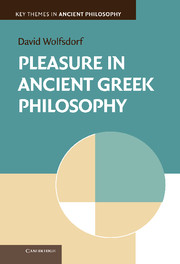Book contents
- Frontmatter
- Contents
- Acknowledgments
- Chapter 1 Introduction
- Chapter 2 Pleasure in early Greek ethics
- Chapter 3 Pleasure in the early physical tradition
- Chapter 4 Plato on pleasure and restoration
- Chapter 5 Plato on true, untrue, and false pleasures
- Chapter 6 Aristotle on pleasure and activation
- Chapter 7 Epicurus and the Cyrenaics on katastematic and kinetic pleasures
- Chapter 8 The Old Stoics on pleasure as passion
- Chapter 9 Contemporary conceptions of pleasure
- Chapter 10 Ancient and contemporary conceptions of pleasure
- Suggestions for further reading
- General Index
- Index of Greek and Latin Words and Expressions
- Index of Quotations from Ancient Authors
- Index of Quotations from Contemporary Authors
Chapter 4 - Plato on pleasure and restoration
Published online by Cambridge University Press: 05 December 2012
- Frontmatter
- Contents
- Acknowledgments
- Chapter 1 Introduction
- Chapter 2 Pleasure in early Greek ethics
- Chapter 3 Pleasure in the early physical tradition
- Chapter 4 Plato on pleasure and restoration
- Chapter 5 Plato on true, untrue, and false pleasures
- Chapter 6 Aristotle on pleasure and activation
- Chapter 7 Epicurus and the Cyrenaics on katastematic and kinetic pleasures
- Chapter 8 The Old Stoics on pleasure as passion
- Chapter 9 Contemporary conceptions of pleasure
- Chapter 10 Ancient and contemporary conceptions of pleasure
- Suggestions for further reading
- General Index
- Index of Greek and Latin Words and Expressions
- Index of Quotations from Ancient Authors
- Index of Quotations from Contemporary Authors
Summary
Turning to Plato (427–347), we turn away from largely fragmentary and sparse testimonial evidence to substantial primary textual evidence and to such evidence as bears directly on the question “What is pleasure?” We have more from Plato on pleasure and specifically on the identity question than from any other ancient author. Because of this, I have divided the discussion of Plato’s treatment of pleasure into two chapters. The emphasis of the present chapter is on what Plato takes pleasure to be. The emphasis of Chapter 5 is on a distinction central to Plato’s thinking about pleasure, namely, between true and untrue or true and false pleasures. As we will see, the two topics overlap to a considerable extent.
Plato discusses pleasure in many of his dialogues. His most important discussions occur in three: Republic (specifically, Book 9), Timaeus, and Philebus. Our discussion will focus on Plato’s treatments of pleasure in these texts. I will also have some things to say about Plato’s treatment of pleasure in two other dialogues, Gorgias and Hippias Major.
- Type
- Chapter
- Information
- Pleasure in Ancient Greek Philosophy , pp. 40 - 62Publisher: Cambridge University PressPrint publication year: 2012

